
JOURNAL OF ANALYTICAL CHEMISTRY
Scope & Guideline
Driving Innovation in Analytical Research
Introduction
Aims and Scopes
- Development of Advanced Analytical Techniques:
The journal publishes research on cutting-edge techniques in analytical chemistry, including chromatography, mass spectrometry, electrochemical sensors, and spectrophotometry, emphasizing methodological advancements and improvements. - Application of Nanotechnology in Analysis:
A core area of focus is the incorporation of nanotechnology in analytical methods, such as the use of nanomaterials for sensor development and extraction processes, enhancing sensitivity and selectivity in chemical analysis. - Environmental and Food Safety Applications:
Research addressing analytical methods for detecting contaminants in environmental samples and food products is a significant focus, reflecting the journal's commitment to public health and environmental sustainability. - Bioanalytical Methods and Medical Diagnostics:
The journal features studies on bioanalytical methods for the detection of biomarkers and pharmaceutical compounds in biological matrices, showcasing advancements in clinical diagnostics and therapeutic monitoring. - Green Chemistry Practices:
A notable emphasis on sustainable and eco-friendly analytical methods is evident, with research exploring green solvents, reduction of hazardous materials, and low-energy consumption techniques.
Trending and Emerging
- Integration of Artificial Intelligence and Machine Learning:
There is a rising trend in the application of AI and machine learning techniques for data analysis and interpretation in analytical chemistry, enhancing the capabilities of traditional methods and enabling complex data handling. - Advancements in Miniaturization and Portable Devices:
The development of portable and miniaturized analytical devices is gaining traction, which allows for on-site analysis and real-time monitoring, particularly in fields such as environmental science and clinical diagnostics. - Focus on Biochemical and Biomedical Applications:
An increasing number of studies are dedicated to biochemical applications, including drug monitoring and biomarker detection, showcasing the journal's commitment to advancing medical diagnostics. - Innovations in Sample Preparation Techniques:
Research on novel sample preparation methods, such as microextraction techniques and the use of new materials for sample cleanup, is becoming more prevalent, emphasizing the importance of efficient and effective sample handling. - Use of Sustainable Materials in Analytical Methods:
The journal is seeing an increase in studies exploring the use of sustainable and biodegradable materials in analytical methods, aligning with global efforts towards sustainability in science.
Declining or Waning
- Traditional Analytical Methods:
There has been a noticeable decrease in papers focusing solely on conventional analytical methods without incorporating novel advancements or interdisciplinary approaches, suggesting a shift towards more innovative and integrated methodologies. - Basic Chemical Analysis without Specific Applications:
Research that presents basic chemical analysis without a specific application or context appears to be declining, as the journal increasingly favors studies that demonstrate practical applications and real-world relevance. - Focus on Non-Sustainable Practices:
Research that does not address sustainability or environmental impact is becoming less prominent, reflecting a growing trend towards green chemistry and eco-friendly analytical practices.
Similar Journals
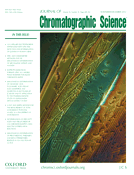
JOURNAL OF CHROMATOGRAPHIC SCIENCE
Connecting Scholars to the World of ChromatographyWelcome to the Journal of Chromatographic Science, a premier publication dedicated to advancing the scientific understanding of chromatographic techniques and their applications across various disciplines. Published by Oxford University Press Inc, this journal, with its ISSN 0021-9665 and E-ISSN 1945-239X, has been disseminating innovative research since 1963, serving as a vital resource for researchers, industry professionals, and academic scholars in the fields of Analytical Chemistry and Medicine. As evidenced by its 2023 Scopus ranking, the journal stands at the Q3 quartile in both its primary disciplines, highlighting its relevance and contribution to ongoing research. The journal promotes high-quality, peer-reviewed articles that aim to foster knowledge and encourage the practical application of chromatographic science. While it operates under a traditional subscription model, the valuable insights it offers are essential for those seeking to enhance their expertise and stay at the forefront of chromatographic methodologies. Join our community of scholars as we explore the complexities and innovations in chromatographic science, paving the way for future discoveries.
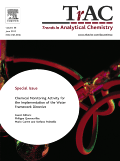
TRAC-TRENDS IN ANALYTICAL CHEMISTRY
Advancing Knowledge in Analytical ChemistryTRAC - Trends in Analytical Chemistry is a prestigious journal published by Elsevier Science Ltd, situated in the Netherlands. With an impressive impact factor reflected in its Q1 rankings across three major categories—Analytical Chemistry, Environmental Chemistry, and Spectroscopy—this journal stands at the forefront of disseminating pioneering research and advancements in the field of analytical chemistry. Established in 1981, TRAC provides a comprehensive platform for researchers to share influential studies and insights related to the latest trends, methodologies, and technologies in analytical techniques. Recognized globally, the journal excels in fostering cross-disciplinary dialogue and innovation, making it an indispensable resource for academics, professionals, and students alike. Explore the latest issues to stay abreast of cutting-edge developments that shape the analytical sciences.

Journal of Analysis and Testing
Innovative insights in analytical chemistry and testing.Journal of Analysis and Testing is a premier academic journal published by SPRINGER SINGAPORE PTE LTD, dedicated to advancing the fields of analytical and environmental chemistry. With ISSN 2096-241X and E-ISSN 2509-4696, the journal has established a significant presence since its inception in 2017, converging its focus until 2024. The journal's outstanding rankings in 2023, including Q1 quartile placements in Analytical Chemistry, Instrumentation, and Spectroscopy, underscore its pivotal role in disseminating high-quality research. Researchers can access cutting-edge studies that explore innovative testing methodologies, electrochemical analyses, and material evaluations, making it an essential resource for professionals and students alike. The Journal of Analysis and Testing not only celebrates advances in science and technology but also promotes interdisciplinary collaborations, ensuring widespread impact across analytical and environmental domains. As such, this journal plays a vital role in shaping the future of analytical practices and methodologies, positioning itself as a key conduit for knowledge exchange in the scholarly community.

Talanta Open
Innovating Insights in Chemical AnalysisTalanta Open (ISSN: 2666-8319) is a prominent open-access journal published by Elsevier, dedicated to advancing the field of Analytical Chemistry. Established in 2020, the journal aims to foster innovative research and facilitate knowledge sharing in the analysis of chemical substances and their interactions. With an impressive Q2 ranking in the Analytical Chemistry category and a commendable Scopus ranking of #57/156, Talanta Open has quickly established itself as a vital resource for researchers, professionals, and students alike. The journal is known for its rigorous peer-review process and commitment to quality, ensuring that published content significantly contributes to the scientific community. By providing unrestricted access to high-quality research, Talanta Open underscores the importance of collaboration and accessibility in the ever-evolving landscape of analytical science.
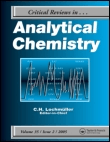
CRITICAL REVIEWS IN ANALYTICAL CHEMISTRY
Synthesizing Knowledge for a Brighter Scientific Future.Critical Reviews in Analytical Chemistry, published by Taylor & Francis Inc, stands as a pivotal journal in the field of analytical chemistry, contributing significantly to its advancement since its inception in 1989. With an impressive Q1 ranking in the 2023 analytical chemistry category, it positions itself among the top 15 journals in the field, reflecting its high impact and relevance, as evidenced by a 90th percentile Scopus rank. This esteemed journal is dedicated to publishing comprehensive reviews that synthesize current research and emerging methods in analytical techniques, making it an invaluable resource for researchers, professionals, and students alike. With the goal of fostering innovation and collaboration, Critical Reviews in Analytical Chemistry continues to address challenges and breakthroughs within the sphere of analytical methodologies, ensuring its authors and readers remain at the forefront of scientific discovery.

CHINESE JOURNAL OF ANALYTICAL CHEMISTRY
Exploring the Depths of Analytical ChemistryCHINESE JOURNAL OF ANALYTICAL CHEMISTRY, published by SCIENCE PRESS in China, stands as a prominent platform in the field of analytical chemistry since its inception in 1989. With its ISSN 0253-3820 and E-ISSN 1872-2040, the journal maintains a vital role in disseminating empirical research and innovative methodologies, contributing to the advancement of analytical techniques and their applications. The 2023 Scopus ranking positions the journal in the third quartile (Q3) within its category, reflecting a respectable standing among its peers. Researchers, professionals, and students alike engage with a broad range of topics, from instrumental analysis to environmental monitoring, each aiming to foster further scientific inquiry. Although it does not currently offer Open Access, the journal's rich repository of knowledge continues to be an essential resource for those in the analytical chemistry community, with an enduring commitment to scientific excellence and collaboration.

MICROCHEMICAL JOURNAL
Catalyzing Progress in Microchemical MethodologiesMicrochemical Journal, published by Elsevier, stands as a leading scholarly publication in the fields of Analytical Chemistry and Spectroscopy, boasting impressive rankings of Q1 and Q2 in their respective categories for 2023. With an H-index reflecting its substantial impact and relevance, this journal has been a cornerstone of research dissemination since its inception in 1957, and it continues to play a vital role in advancing the methodological and technological innovations within these disciplines. The journal presents peer-reviewed articles that explore a wide array of topics, making it an essential resource for researchers, professionals, and students keen on the latest advancements in microchemical processes and techniques. Although it does not currently offer open access options, its publication through Elsevier ensures a high standard of academic integrity and wide accessibility through various academic institutions. With a strong Scopus ranking—9th in Chemistry Spectroscopy and 22nd in Analytical Chemistry—Microchemical Journal is an indispensable platform for empirical studies, insightful reviews, and pioneering methodologies in the microchemical domain.
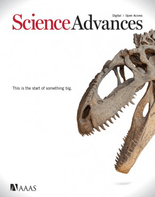
Science Advances
Your Gateway to Cutting-Edge ResearchScience Advances, published by the American Association for the Advancement of Science, is a leading open-access journal in the field of multidisciplinary sciences. Since its inception in 2015, it has rapidly gained prominence, achieving a remarkable Q1 ranking in both Medicine (miscellaneous) and Multidisciplinary categories, underlining its impact and relevance in contemporary research. With an impressive Scopus ranking of #7 out of 171 in the Multidisciplinary field, it proudly sits in the 96th percentile, showcasing its dedication to disseminating high-quality research across various scientific domains. This journal not only provides open access to innovative findings but also aims to foster collaboration and maintain a high standard of scholarly communication among researchers, professionals, and students globally. Stay updated with some of the most groundbreaking advancements and contribute to the collective pursuit of scientific knowledge through Science Advances.
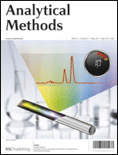
Analytical Methods
Connecting Ideas, Transforming PracticesAnalytical Methods, published by the renowned Royal Society of Chemistry, is a distinguished journal that has been serving the scientific community since its inception in 2009. Specializing in the fields of Analytical Chemistry, Chemical Engineering, and General Engineering, this journal holds a reputable position with an impressive Q2 ranking in three relevant categories as of 2023. With its focus on innovative methodologies and advanced applications in analytical science, it aims to disseminate cutting-edge research and foster dialogue among researchers, professionals, and students. Although it is not an open access publication, it is accessible worldwide and provides critical insights into the latest developments in analytical techniques and their engineering applications. The journal also ranks highly in pertinent Scopus categories, such as being in the 77th percentile for General Engineering and 61st percentile for Analytical Chemistry, underlining its significance in advancing knowledge and practical applications in these fields. By participating in this journal, readers can expect to engage with high-quality research that influences the future of analytical practices and chemical engineering.
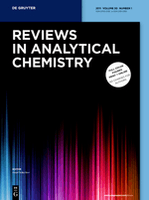
REVIEWS IN ANALYTICAL CHEMISTRY
Exploring the Frontiers of Analytical ResearchREVIEWS IN ANALYTICAL CHEMISTRY, published by De Gruyter Poland Sp. z o.o., serves as a pivotal resource in the field of analytical chemistry, with a notable impact factor indicative of its scholarly significance. As an Open Access journal since 2020, it ensures widespread dissemination of high-quality research articles, facilitating knowledge sharing among researchers, professionals, and students alike. With its origins tracing back to 1980, the journal has adeptly adapted over the years to encompass emerging trends and innovations within analytical methodologies, maintaining its relevance and authority in the discipline. The journal is ranked in the Q2 category of analytical chemistry in 2023 and holds a commendable Scopus rank of #32 out of 156, reflecting its strong performance and the quality of the studies published. Researchers looking for cutting-edge reviews and insights will find this journal an invaluable platform for advancing their knowledge and research in analytical chemistry.